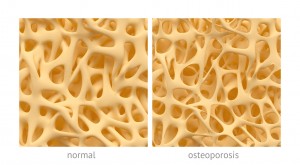

 Psoriasis or psoriatic arthritis patients show higher osteoporosis and osteopenia prevalence, according to research. M. Elaine Husni, MD, MPH, Vice Chair of Rheumatology and Director of the Arthritis and Musculoskeletal Center at Cleveland Clinic, said, “Clinicians who treat patients with psoriasis or psoriatic arthritis should be on alert for an association with osteopenia and osteoporosis.” The researchers suggest there is strong evidence to link psoriatic arthritis to bone loss, and there is an independent association between psoriasis and low mineral density.
Psoriasis or psoriatic arthritis patients show higher osteoporosis and osteopenia prevalence, according to research. M. Elaine Husni, MD, MPH, Vice Chair of Rheumatology and Director of the Arthritis and Musculoskeletal Center at Cleveland Clinic, said, “Clinicians who treat patients with psoriasis or psoriatic arthritis should be on alert for an association with osteopenia and osteoporosis.” The researchers suggest there is strong evidence to link psoriatic arthritis to bone loss, and there is an independent association between psoriasis and low mineral density.
The researchers theorize that chronic inflammation in psoriasis and psoriatic arthritis could result in low mineral density, causing an imbalance between bone absorption and bone repair.
Dr. Husni cited studies that showed a high prevalence of osteoporosis and osteopenia among psoriasis and psoriatic arthritis patients. The authors urged “high index of suspicion” for osteoporosis in patients with psoriatic arthritis.
In an alternative study carried out by S. D’Epiro et al., 43 psoriasis patients were examined to determine the severity and prevalence of osteoporosis and osteopenia. The researchers found that duration of psoriasis and psoriatic arthritis was longer in individuals with osteoporosis and osteopenia. The authors urge early evaluation of bone metabolism in patients with psoriasis, especially in those who have had the disease for a longer time period.
Dr. Husni added, “We check bone density initially and regularly in men over 50 and postmenopausal women with psoriatic arthritis since we know these patients are at increased risk. Younger patients may need testing if they have additional risk factors, such as steroid use or previous fracture. Patients who are at high risk for fracture, based on bone density and clinical risk factors using the Fracture Risk Assessment (FRAX) algorithm, are started on an osteoporosis medication.”
Preventing osteoporosis and osteopenia involves similar tactics. These include getting sufficient amounts of calcium (1,000 to 1,500 mg) and vitamin D, exercising regularly – especially emphasizing weight-bearing exercises as these help strengthen bones, having your bones checked to spot any changes in bone health early on, and being mindful of prescription medications especially corticosteroids as they can contribute to bone loss.
Diet can play a large factor in bone health as well, and alcohol and caffeine have been shown to weaken bones. In terms of alcohol consumption, moderate consumption is okay. However, consuming two or more drinks per day has shown to impact bone formation and make it difficult for bones to metabolize calcium.
Here are some of the exercise regiments that can help you prevent and treat osteoporosis and osteopenia:
If you have psoriasis or psoriatic arthritis, your treatment for these conditions could interfere with your bone health, so check with your doctor to monitor your bones and make the necessary lifestyle changes to keep them strong.
Osteopenia natural treatment, prevent low bone density with diet and exercise
Many people are familiar with the term osteoporosis, but fewer have heard the term osteopenia, which means lower bone density than normal. If you have osteopenia, your bone density may be lower than normal peak level, but it isn’t low enough to be considered osteoporosis. Continue reading…
Psoriasis and psoriatic arthritis – major risk factors for cardiovascular disease
Psoriatic arthritis and psoriasis are major risk factors for cardiovascular disease. Researcher Dr. Ari Polachek wrote, “[T]hese findings support the notion that PsA [psoriatic arthritis] should be considered as an independent risk factor for cardiovascular diseases.” Continue reading…
Copyright © www.orthopaedics.win Bone Health All Rights Reserved